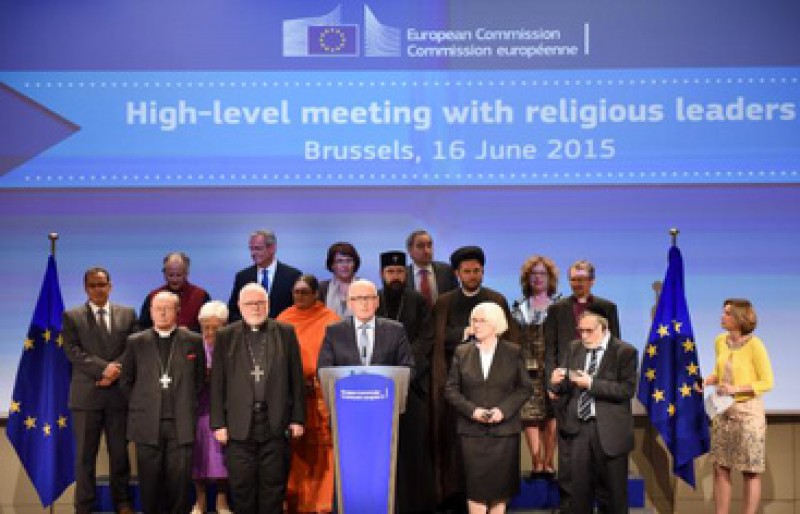Press Release No: 15/27
Brussels
16 June 2015
On 16 June senior Christian, Muslim, Jewish, Buddhist, Hindu, and Mormon leaders gathered for the 11th annual high-level meeting at the European Commission.
Held at the invitation of European Commission First Vice-President Frans Timmermans, this gathering focused on “Living together and disagreeing well.” The Conference of European Churches was represented by CEC President Rt Rev. Christopher Hill KCVO, DD and Pastor François Clavairoly, President of the Protestant Federation of France.
Other CEC Member Churches were present at the meeting, including CEC Governing Board member His Eminence Metropolitan Joseph, Romanian and Orthodox Metropolis of Western and Southern Europe (Please see complete list below). European Parliament Vice-President Antonio Tajani was also present.
Participants discussed a range of topics of common interest, including the emergence of radicalised fighters from Europe, ongoing migrant deaths and refugee crises, and the role of social media as a place for positive contributions from religions.
This dialogue feeds into the first annual European Commission colloquium on fundamental rights on 1 and 2 October 2015.
On the deplorable situation of repeated loss of life in the Mediterranean, CEC President Hill said that faith communities must play an important role in drawing attention to the crises and working for its resolution. “The issue of migration and asylum seeking is a major part of our agenda all the time. Not only the churches, but all the faith communities of Europe, have a responsibility to be a conscience for all.”
Hill also stressed the unique bridge-building role religious leaders can play in Europe. They are often deeply committed to local, regional, national communities and their interests, while accessing a broader European view through dialogues such as these.
High-level meetings and working level discussions are held regularly between the European Commission and churches and religious associations and communities as well as philosophical and non-confessional organisations. Since 2009 the dialogue with churches, religions, philosophical and non-confessional organisations is enshrined in the Lisbon Treaty.
Participants:
Ms Joelle Aflalo, Jewish Community of Luxembourg
Mr François Clavairoly, Président de la Fédération Protestante de France
Mr Jamie Cresswell, President of the European Buddhist Union
His Excellency Albert Guigui, Chief Rabbi of Brussels and Permanent Representative to the EU Conference of European Rabbis
Mr Khalid Hajji, Secretary General of the European Moroccan Oulema
Ms Svamini Hamsananda, Hindu Forum of Europe
His Excellency The Right Reverend Christopher Hill, President of the Conference of European Churches
His Excellency The Right Reverend Robert Innes, Bishop in Europe
Elder Patrick Kearon, First Counsellor in the Europe Area - The Church of Jesus Christ of Latter-day Saints
His Eminence Cardinal Reinhard Marx, Archbishop of Munich and Freising and President of COMECE
His Eminence Metropolitan Joseph, Romanian and Orthodox Metropolis of Western and Southern Europe
Mr Ali Sayed Razawi, Joint Secretary General of Majlis e Ulama e Shia Europe
Ms Irmgard Schwaetzer, Präses of the Synode of the Evangelical Church in Germany
Ms Maria Voce, President of the Focolare Movement
Ms Catherine Karkala-Zorba, Orthodox Academy of the Ecumenical Patriarchate, Greece
For more information or an interview, please contact:
Erin Green
Communication Coordinator
Conference of European Churches
Rue Joseph II, 174 B-1000 Brussels
Tel. +32 2 234 68 42
Fax +32 2 231 14 13
E-mail: eeg@cec-kek.be
Website: www.ceceurope.org
Facebook: www.facebook.com/ceceurope
Twitter: @ceceurope
The Conference of European Churches (CEC) is a fellowship of some 114 Orthodox, Protestant, Anglican and Old Catholic Churches from all countries of Europe, plus 40 national council of churches and organisations in partnership. CEC was founded in 1959. It has offices in Brussels and Strasbourg.
